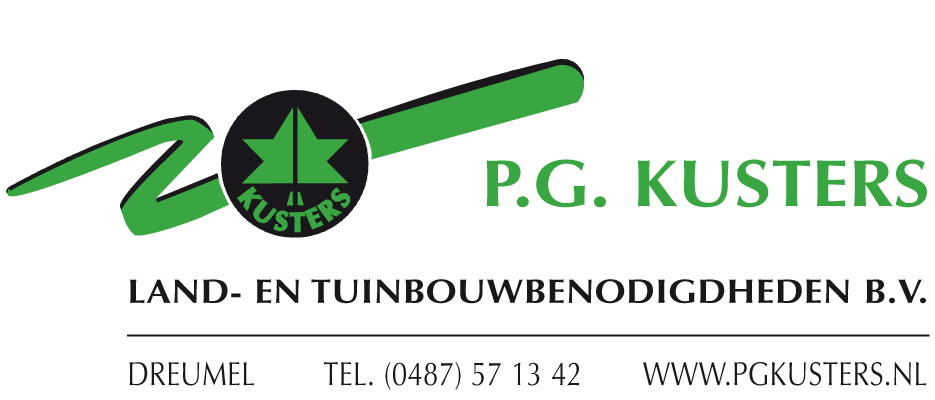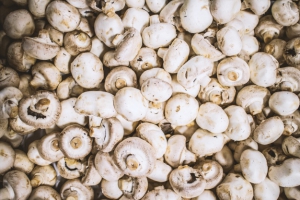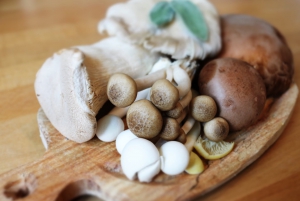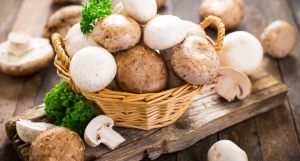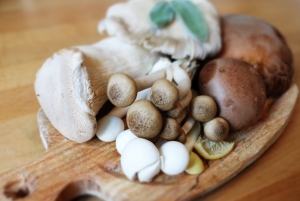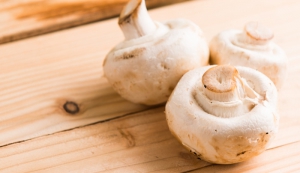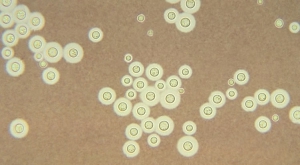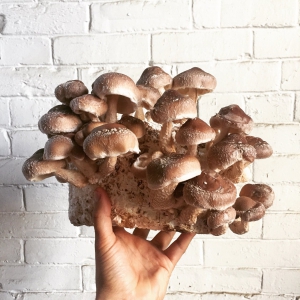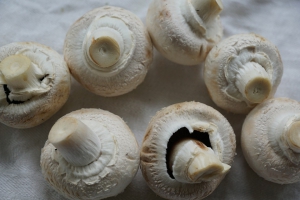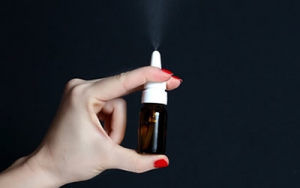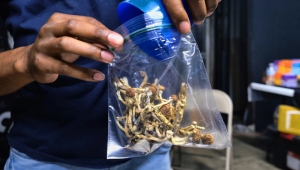The value of the global functional mushroom market
The global functional mushroom market was valued at USD 25,415.12 million in 2020, and it is estimated to register a CAGR of 8.44% during the forecast period 2021-2026.
Mushrooms that support immune health have benefited since the start of the COVID-19 pandemic, with high interest from food, beverage, and nutritional supplement manufacturers, which has carried over to the entire mushroom category.
There exists a high demand for safe and natural immune-supportive health products, including supplements featuring mushrooms that support immune health, such as chaga, reishi, shiitake, cordyceps, and turkey tail.
- Over the long term too, functional mushrooms are expected to find application in a wide variety of healthcare or pharmaceutical products, which has increases the applicability of mushrooms in the food and beverage sector. As products infused with mushroom ingredients are becoming a big part of the trend of self care, offering a recognizable source of delivery formats and impressive health benefits, the market demand is expected to continue to grow over the forecast period.
Please read the full article here.
Source: ReportLinker
Help us with our positive mushroom campaign!
We are all experiencing difficult and challenging times. Times we have never experienced before and hopefully we can all recover from it. Our health is the most important thing to focus on as well as taking care of eachother. Maybe we are even more closer than ever!
This corona virus has besides to our health, also a large impact on mushroom businesses, hopefully you all have found ways to cope with it. Maybe even accelerate your innovation roadmap!
We as Mushroom Matter haved asked ourselves the question how we can become more closer and more meaningful to people around the globe during this period. So we are going to focus on the health benefits of mushrooms and make sure that the mushroom finds it's way to the consumer even more.
We are starting a positive mushroom campaign on our website and social media channels #mushroomsmatterforyourhealth and would kindly appreciate your help by sending us information you have on mushrooms and why they are so important for our health and future*. Please send us your input to This email address is being protected from spambots. You need JavaScript enabled to view it.
* information we are allowed to use in relation to GDPR and authorship
Feed Your Immune System
The immune system is made up of a network of cells, tissues and organs that work together to protect the body against infection and maintain overall health. Mushrooms, like other fruits and vegetables, can play a positive role in supporting a healthy immune system.
The 2015-2020 Dietary Guidelines for Americans1 emphasizes the importance of creating a healthy eating pattern to maintain health and reduce the risk of disease. Suggestions include:
• Make half your plate fruits and vegetables.
• Move to low-fat and fat-free milk or yogurt.
• Make half your grains whole grains.
• Focus on whole fruits and vary your vegetables.
• Drink and eat less sodium, saturated fat and added sugars.
• Vary your protein routine.
Nutrients Important for Overall WellnessThere are a variety of micronutrients, as identified by the Linus Pauling Institute at Oregon State University2, that are important for supporting a healthy immune system including selenium and vitamins D and B6, which can be found in mushrooms.
As COVID-19 tightens its grip on the world, more and more of us are naturally looking for ways to help stave of contracting the virus, whether it’s for ourselves, or to protect those around us who might be at higher risk of developing serious complications.
But while there’s no vaccine to ward off coronavirus (though scientists around the world are working tirelessly on creating one) there are some easy, natural steps you can take to strengthen your immune system to help you fight of this virus, and illnesses like it.
Read the full article here.
The coronavirus presents many uncertainties, and none of us can completely eliminate our risk of getting COVID-19. But one thing we can do is eat as healthily as possible.
If we do catch COVID-19, our immune system is responsible for fighting it. Research shows improving nutrition helps support optimal immune function.
Micronutrients essential to fight infection include vitamins A, B, C, D, and E, and the minerals iron, selenium, and zinc.
Here’s what we know about how these nutrients support our immune system and the foods we can eat to get them.
Fungi That 'Eat' Radiation Are Growing on the Walls of Chernobyl's Ruined Nuclear Reactor
Back in 1991, scientists were amazed when they made the discovery...
In the eerie environment inside the abandoned Chernobyl Nuclear Power Plant, researchers remotely piloting robots spotted pitch black fungi growing on the walls of the decimated No. 4 nuclear reactor and even apparently breaking down radioactive graphite from the core itself. What's more, the fungi seemed to be growing towards sources of radiation, as if the microbes were attracted to them!
More than a decade later, University of Saskatchewan Professor Ekaterina Dadachova (then at the Albert Einstein College of Medicine in New York) and her colleagues acquired some of the fungi and found that they grew faster in the presence of radiation compared to other fungi. The three species tested, Cladosporium sphaerospermum, Cryptococcus neoformans and Wangiella dermatitidis, all had large amounts of the pigment melanin, which is found – among many places – in the skin of humans. People with a darker skin tone have much more of it. Melanin is known to absorb light and dissipate ultraviolet radiation, but in the fungi, it seemed to also be absorbing radiation and converting it into chemical energy for growth, perhaps in a similar fashion to how plants utilize the green pigment chlorophyll to attain energy from photosynthesis.
Back in 1991, scientists were amazed when they made the discovery...
In the eerie environment inside the abandoned Chernobyl Nuclear Power Plant, researchers remotely piloting robots spotted pitch black fungi growing on the walls of the decimated No. 4 nuclear reactor and even apparently breaking down radioactive graphite from the core itself. What's more, the fungi seemed to be growing towards sources of radiation, as if the microbes were attracted to them!
More than a decade later, University of Saskatchewan Professor Ekaterina Dadachova (then at the Albert Einstein College of Medicine in New York) and her colleagues acquired some of the fungi and found that they grew faster in the presence of radiation compared to other fungi. The three species tested, Cladosporium sphaerospermum, Cryptococcus neoformans and Wangiella dermatitidis, all had large amounts of the pigment melanin, which is found – among many places – in the skin of humans. People with a darker skin tone have much more of it. Melanin is known to absorb light and dissipate ultraviolet radiation, but in the fungi, it seemed to also be absorbing radiation and converting it into chemical energy for growth, perhaps in a similar fashion to how plants utilize the green pigment chlorophyll to attain energy from photosynthesis.
Click here for the full article
Source: RealClear Science By Ross Pomeroy - RCP Staff
Researchers from Tohoku University suggest that consuming mushrooms on a regular basis reduces the risk of prostate cancer in men - especially those aged 50 or older.
It’s a love or hate ingredient, but a new study has revealed a link between eating mushrooms and lower risk of prostate cancer. Researchers from Tohoku University suggest that consuming mushrooms on a regular basis reduces the risk of prostate cancer in men - especially those aged 50 or older. Dr Shu Zhang, who led the study, said: "Test-tube studies and studies conducted on living organisms have shown that mushrooms have the potential to prevent prostate cancer. "However, the relationship between mushroom consumption and incident prostate cancer in humans has never been investigated before. "To the best of our knowledge, this is the first cohort study indicating the prostate cancer-preventive potential of mushrooms at a population level.”
In the study, the researchers surveyed 36,499 men about their lifestyle choices including food consumption, psychical activity and smoking and drinking habits, and analysed their medical records. The results revealed that overall, 3.3% of the participants developed prostate cancer during a follow-up period. However, participants who ate mushrooms once or twice a week had an 8% lower risk of developing the disease, compared to those who ate mushrooms less than once a week. Meanwhile, men who ate mushrooms more than three times a week had a 17% lower risk.
Source: Shivali Best, Mirror online
UNIVERSITY PARK, Pa. — Mushrooms contain unusually high amounts of two antioxidants that some scientists suggest could help fight aging and bolster health, according to a team of Penn State researchers.
In a study, researchers found that mushrooms have high amounts of ergothioneine and glutathione, both important antioxidants, said Robert Beelman, professor emeritus of food science and director of the Penn State Center for Plant and Mushroom Products for Health. He added that the researchers also found that the amounts of the two compounds varied greatly between mushroom species.
"What we found is that, without a doubt, mushrooms are the highest dietary source of these two antioxidants taken together, and that some types are really packed with both of them," said Beelman.
Beelman said that when the body uses food to produce energy, it also causes oxidative stress because some free radicals are produced. Free radicals are oxygen atoms with unpaired electrons that cause damage to cells, proteins and even DNA as these highly reactive atoms travel through the body seeking to pair up with other electrons.
Replenishing antioxidants in the body, then, may help protect against this oxidative stress.
"There's a theory — the free radical theory of aging — that's been around for a long time that says when we oxidize our food to produce energy there's a number of free radicals that are produced that are side products of that action and many of these are quite toxic," said Beelman. "The body has mechanisms to control most of them, including ergothioneine and glutathione, but eventually enough accrue to cause damage, which has been associated with many of the diseases of aging, like cancer, coronary heart disease and Alzheimer's."
According to the researchers, who report their findings in a recent issue of Food Chemistry, the amounts of ergothioneine and glutathione in mushrooms vary by species with the porcini species, a wild variety, containing the highest amount of the two compounds among the 13 species tested.
"We found that the porcini has the highest, by far, of any we tested," said Beelman. "This species is really popular in Italy where searching for it has become a national pastime."
The more common mushroom types, like the white button, had less of the antioxidants, but had higher amounts than most other foods, Beelman said.
The amount of ergothioneine and glutathione also appear to be correlated in mushrooms, the researchers said. Mushrooms that are high in glutathione are also high in ergothioneine, for example.
Cooking mushrooms does not seem to significantly affect the compounds, Beelman said.
"Ergothioneine is very heat stable," said Beelman.
Beelman said that future research may look at any role that ergothioneine and glutathione have in decreasing the likelihood of neurodegenerative diseases, such as Parkinson's disease and Alzheimer's disease.
"It's preliminary, but you can see that countries that have more ergothioneine in their diets, countries like France and Italy, also have lower incidences of neurodegenerative diseases, while people in countries like the United States, which has low amounts of ergothioneine in the diet, have a higher probability of diseases like Parkinson's Disease and Alzheimer's," said Beelman. "Now, whether that's just a correlation or causative, we don't know. But, it's something to look into, especially because the difference between the countries with low rates of neurodegenerative diseases is about 3 milligrams per day, which is about five button mushrooms each day."
Beelman worked with Michael D. Kalaras, postdoctoral assistant in food sciences; John P. Richie, professor of public health sciences and pharmacology; and Ana Calcagnotto, research assistant in public health sciences.
Source: PennState
This cutting-edge psychedelic tech company with its roots in innovative cannabis treatment modalities has developed a patent-pending nasal spray for microdosing psilocybin --and users love it.
Silo Wellness, an Oregon company with a team with roots in cannabis delivery modalities, has developed a magic mushroom nasal spray for controlled, metered-dosing consumer microdosing. The company predicts that new users will be more drawn to experimenting with psilocybin’s wellness effects with convenient microdosing before they commit to the full-blow psychedelic “trip” sessions.
“I love our product and can’t wait until it’s legal in the United States, so we can share it with crime victims and first responders,” Silo Wellness founder Mike Arnold said. After formulating the product in Jamaica (where mushrooms are legal) with a team led by Missouri pharmacologist Parag Bhatt and company COO and Marine combat veteran Scott Slay, team members first tested the product on themselves before taking volunteers’ testimonials in private microdosing sessions.
The “Origin Story” of Silo Wellness and their Metered-Dosing Solutions
The visionary inventors of Silo Wellness’s first product to be publicly disclosed under their intellectual property have been working on this project since “before it was cool.” “National media didn’t care about psychedelics until Denver passed their decriminalization ballot measure,” Arnold stated. “Before that, everyone thought I was crazy when I told them that we were entering the medicinal psychedelics space in advance of Oregon legalizing in 2020.”
Silo Wellness founder Mike Arnold made headlines when he exited the practice of law to ultimately grow 40,000 marijuana plants in Oregon in 2017. “I had been hobby farming livestock for years. Since I was a kid, I always dreamt of farming fulltime. I just couldn’t pass up the cannabis opportunity when it presented itself. But I never thought I would exit cannabis and pivot full time into psychedelics, but they changed my life. I want to share this medicine with the world by making it affordable and comfortable for all.”
Arnold was a high-profile criminal defense attorney from Oregon before retiring to start his farms. He made national headlines for his part in stopping the armed Malheur Refuge Occupation led by his then-client Ammon Bundy. He was also featured in in two episodes of 48 Hours and successfully defended a marine sniper’s road-rage shooting murder case for which he wrote a well-reviewed book on self-defense in the criminal justice system that was banned in Oregon prisons.
The “Shroom Boom” is the “New Cannabis Green Rush” and the Peer-Reviewed Studies Are Even Stronger than Marijuana
With ROI reducing in cannabis startups in Canada and the United States, Arnold watched investors and hopeful entrepreneurs in his home state of Missouri still blindly running full speed to the new Missouri medical marijuana market, as it was gearing up to pass in 2018. “While everyone else saw the excitement for Missouri cannabis as a good sign for an investment, I saw it as the death nail. When everyone is running in one direction, that’s the last place an entrepreneur or investor wants to be. If you were on time for cannabis, you were already too late.”
That’s why Arnold began working with the inventor of the patent-pending Mystabis hemp and marijuana inhalers, Michael Hartman, to begin the brainstorming for their newest product line of metered-dosing solutions.
“I came a little late to the magic mushroom space as a user,” Arnold continued. “I had no information about the medicinal benefits for PTSD and anxiety until I met a doctor while traveling in the spring of 2018 who blew my mind with the research and offered to take me on a guided meditation with mushrooms right there on the spot. I told him I was terrified to use them. ‘How do you know how much you are ingesting? What if I take too much?’ I asked.”
“He replied, ‘Mike, you know me; I’m a doctor.’ Enough said,” Arnold recalls. “I trusted him and it changed my life. Mushrooms have been life-changing and I want to share this healing opportunity with the world with a purpose-driven company mindful of consumer access to these gifts of nature.”
A future where a key ingredient of psychedelic mushrooms called psilocybin is regularly used to improve our mental health is none too far off. This month, the Food and Drug Administration (FDA) granted a “breakthrough therapy” designation to a non-profit company developing psilocybin as a treatment for clinical depression. The label is intended to speed up the review process needed for approval.
As far back as the 1970s, some therapists have used the mind-altering effects of hallucinogenic compounds like psilocybin to treat their patients’ depression or anxiety (usually alongside conventional therapy). But as these compounds became popular recreational drugs, governments around the world banned their use entirely, including in a medical setting. Over the years, though, advocates have slowly convinced regulatory agencies like the FDA to reconsider this stance, especially given the lack of options available to people who don’t respond to typical antidepressants (which may be as high as 55 percent of all patients).
Author: Ed Cara
Read the full articel here



